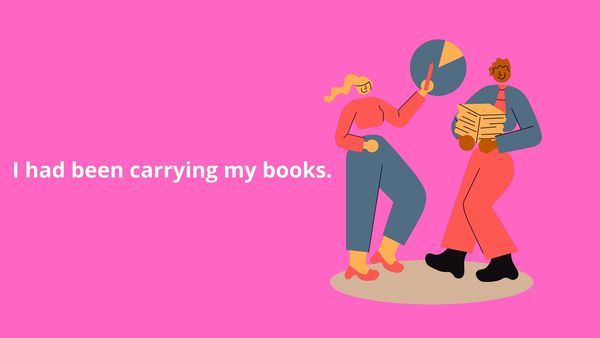The Past Perfect Continuous Tense reveals that an action began at a certain point in the past and also continued till another point of time in the past. It generally tells about the duration of action. STRUCTURE:Subject + Helping Verb + Be form + Main Verb + Rest of the sentence MAKING POSITIVE SENTENCES | |||||
Subject | Helping Verb | Be form | Main Verb | Rest of the sentence | |
I | had | been | going | to school. | |
We | had | been | going | to school. | |
You | had | been | going | to school. | |
He | had | been | going | to school. | |
She | had | been | going | to school. | |
It | had | been | going | to school. | |
Raju | had | been | going | to school. | |
They | had | been | going | to school. | |
Raju and Rani | had | been | going | to school. | |
MAKING NEGATIVE SENTENCES | |||||
| |||||
Subject | Helping Verb | Adverb | Be form | Main Verb | Rest of the sentence |
I | had | not | been | going | to school. |
We | had | not | been | going | to school. |
You | had | not | been | going | to school. |
He | had | not | been | going | to school. |
She | had | not | been | going | to school. |
It | had | not | been | going | to school. |
Raju | had | not | been | going | to school. |
They | had | not | been | going | to school. |
Raju and Rani | had | not | been | going | to school. |
| |||||
MAKING POSITIVE INTERROGATIVE SENTENCES | |||||
Helping Verb | Subject | Be form | Main Verb | Rest of the sentence | |
| Had | I | been | going | to school? | |
| Had | we | been | going | to school? | |
Had | you | been | going | to school? | |
Had | he | been | going | to school? | |
Had | she | been | going | to school? | |
Had | it | been | going | to school? | |
Had | Raju | been | going | to school? | |
Had | they | been | going | to school? | |
Had | Raju and Rani | been | going | to school? | |
MAKING NEGATIVE INTERROGATIVE SENTENCES | |||||
Helping Verb | Subject | Adverb | Be form | Main Verb | Rest of the sentence |
Had | I | not | been | going | to school? |
Had | we | not | been | going | to school? |
Had | you | not | been | going | to school? |
Had | he | not | been | going | to school? |
Had | she | not | been | going | to school? |
Had | it | not | been | going | to school? |
Had | Raju | not | been | going | to school? |
Had | they | not | been | going | to school? |
Had | Raju and Rani | not | been | going | to school? |
Phrasal verbs for daily conversation PHRASAL VERBS FOR DAILY CONVERSATION Introduction: English is a fascinating language with many complexities and nuances. In this blog post, we will explore what phrasal verbs are. Why and when we use them, the best ways to learn them, and a list of the top 45 phrasal verbs to use daily. What is a phrasal verb? A phrasal verb is a verb that contains two or more words as a whole. The first word is usually a verb, and the second is an adverb or a preposition. Together, they create a new meaning that is different from individual words. For instance, the phrasal verb lookup means to search for information. The separate words look and up do not have this meaning alone. But they create a new one when used together. Where and when do we use phrasal verbs? Phrasal verbs are significant in English, especially in spoken language. They add variety and depth to our language and allow us to express more complex ideas and emotions. They are common in m...
